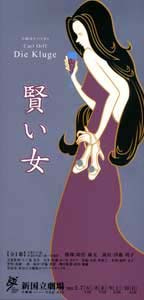|
|
 |
The New National Theatre
Tokyo The Pit Opera #6
Carl Orff : Die Kluge
Opera in 1 Act (Music sung in German with Japanese dialogue and supertitles)
THE PIT
|
| <STAFF> |
|
| Conductor |
: Tokito Yasufumi |
| Production |
: Ito Akiko |
|
|
Artistic Director
|
: Igarashi Kiyoshi |
| Libretto and Composed by |
: Carl Orff |
| Set Designer |
: Osawa Sachiko |
| Costume Designer |
: Maeda Ayako |
| Lighting Designer |
: Naruse Kazuhiro |
| Choreographer |
: Ito Tae |
| Stage Manager |
: Murata Kensuke |
| Orchestra |
: New National Theatre The Pit Opera Ensemble |
|
| <CAST> |
|
| February 2002 |
Thu.7 |
Fri.8 |
Sat.9 |
Sun.10 |
| The King |
Maiya Takehiko |
X |
|
X |
|
| Kojima Kiyoshi |
|
X |
|
X |
| The Peasant |
Uno Tetsuya |
X |
|
X |
|
| Tsutsui Shuhei |
|
X |
|
X |
| The Peasant's daughter |
Yamamoto Miki |
X |
|
X |
|
| Fujita Minako |
|
X |
|
X |
| The Jailer |
Odagawa Tetsuya |
X |
|
X |
|
| Miyamoto Toshikazu |
|
X |
|
X |
| The Man with the Donkey |
Takano Jiro |
X |
|
X |
|
| Mochizuki Tetsuya |
|
X |
|
X |
| The Man with the Mule |
Narita Hiroyuki |
X |
|
X |
|
| Tsuchiya Kojiro |
|
X |
|
X |
| First Vagabond |
Yukawa Akira |
X |
|
X |
|
| Takahashi Jun |
|
X |
|
X |
| Second Vagabond |
Sasakura Naoya |
X |
|
X |
|
| Shinkoda Takeshi |
|
X |
|
X |
| Third Vagabond |
Kuroki Jun |
X |
|
X |
|
| Shinoki Junichi |
|
X |
|
X |
|
| <PERFORMANCES> |
|
| February 2002 |
Thursday 7 |
Friday 8 |
Saturday 9 |
Sunday10 |
| 3:00pm |
|
|
X |
X |
| 7:00pm |
X |
X |
|
|
|
| <ADVANCE TICKETS> |
|
Available from Sunday 23 December, 2001 at 10:00 am.
To order tickets, please call +81-3-5352-9999 (10:00am-6:00pm).
Internet ticket reservation available through the following Website.(Japanese only)
http://t.pia.co.jp/ |
| <TICKET PRICES> |
|
All Seats Reserved: ¥4,200
Seat Z(¥1,500) is sold only on the performance day at the Box Office
and exclusive Ticket Pia Offices. |
 Explanations Explanations
The sixth in the opera series at the Pit is the stylish Die Kluge
(The Wise Woman) by Carl Orff (1895-1982), the German composer famed for
his scenic cantata Carmina Burana (Songs of Beuren). In Die Kluge,
which takes its subject from Grimm's Fairy Tales, a comical story of a peasant's
daughter (the wise woman) winning the king's favor, is lively told with
vibrant music unique to Orff.
Synopsis
A peasant digs up a mortar of pure gold and decides to present it to the
king, but his daughter advises him not to do so because the king will demand
a pestle as well. As expected, the peasant is thrown into prison rather
than receiving a reward because the mortar is not accompanied by a pestle.
Hearing rumors about the daughter, the king orders that she be summoned
and puts three riddles to her. Impressed with her witty answers, the king
receives her as his consort. The king, however, finds his overly wise consort
unmanageable and orders her to pack a trunk with whatever she cannot live
without and leave. During the last dinner with his consort, the king falls
asleep and then finds himself in the trunk and asks her why he is in it.
The wise woman replies with a smile, "It is you that told me to pack
the trunk with whatever I consider most important and leave." |



|
|

 Explanations
Explanations